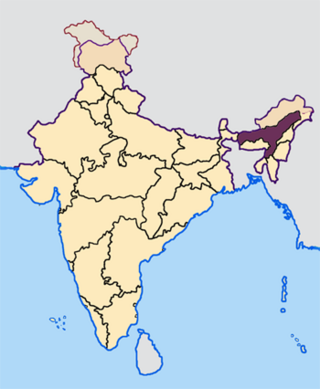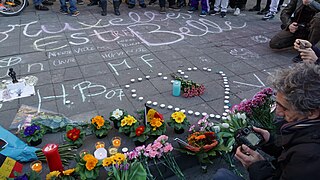
The 7 July 2005 London bombings were a series of suicide attacks carried out by homegrown terrorists on London's public transport network during the morning rush hour.
Statements in response to the 11 July 2006 Mumbai train bombings came from heads of state, political leaders, and militant leaders from around the world. Most offered some sort of condemnation of the attacks and commented on terrorism as a whole.
The 2007 Samjhauta Express bombing was a terrorist attack that occurred around midnight on 18 February 2007 on the Samjhauta Express, a twice-weekly train service connecting Delhi, India, and Lahore, Pakistan. Bombs were set off in two carriages, both filled with passengers, just after the train passed Diwana near the Indian city of Panipat, 80 kilometres (50 mi) north of New Delhi. 70 people were killed in the ensuing fire and dozens more were injured. Of the 70 fatalities, most were Pakistani civilians. The victims also included some Indian civilians and three railway policemen.
In the Lal Masjid bombing of 6 July 2008 at 7:50 pm local time, a 30-year-old suicide bomber blew himself up near the Lal Masjid mosque in Islamabad, the capital of Pakistan, killing 18 policemen and 1 civilian. The bombing occurred on the first anniversary of the siege of Lal Masjid and was likely a revenge attack. The attack occurred even amid tight security in Islamabad, where thousands of Islamic students in Pakistan came to mark the day when Pakistani troops stormed Lal Masjid. Pakistani Interior Minister Rehman Malik, who visited the blast site, said about 12,000 students attended the rally and the attack was directed at police.
2008 Bangalore serial blasts occurred on 25 July 2008 in Bangalore, India. A series of nine bombs exploded in which 1 person was killed and 20 injured. According to the Bangalore City Police, the blasts were caused by low-intensity crude bombs triggered by timers.
The 2008 Ahmedabad bombings were a series of 21 bomb blasts that hit Ahmedabad, India, on 26 July 2008, within a span of 70 minutes. Fifty-six people were killed and over 200 people were injured. Ahmedabad is the cultural and commercial heart of Gujarat state and a large part of western India. The blasts were considered to be of low intensity and were similar to the Bangalore blasts, Karnataka which occurred the day before. This bombings were done by Pakistani Islamic Terrorist group Harkat-ul-Jihad al-Islami.
Indian Mujahideen (IM) is an Islamist terrorist group which has been particularly active in India. The jihadist group was founded as an offshoot of the Students' Islamic Movement of India (SIMI) by several radicalized members including Iqbal Bhatkal, Riyaz Bhatkal, Yasin Bhatkal, Abdul Subhan Qureshi, Amir Reza Khan and Sadiq Israr Sheikh, among others. It has been active since at least 2005 when it bombed the Dashashwamedh Ghat in Varanasi. It carried out several serial-bombings in Indian cities in the following years notably the 2007 Uttar Pradesh bombings, 2008 Jaipur bombings, 2008 Ahmedabad bombings, 2008 Delhi bombings, 2010 Pune bombing, 2011 Mumbai bombings, 2011 Delhi bombing, 2013 Patna bombings, 2013 Hyderabad blasts and the 2013 Bodh Gaya bombings.

The 27 September 2008 Delhi bombing in India's second largest metropolis left three people dead and twenty-three more injured, on an infamous Saturday. The explosion occurred at 14:15, in Mehrauli's Electronic market called Sarai. Initially, there were reports of two persons, including a thirteen-year-old boy, named Santosh being killed in the attack. However, the next day the death toll rose to three. About 23 others were injured and were treated at AIIMS and Fortis Hospital. The bombing took place exactly two weeks after the five serial blasts in Delhi on 13 September 2008.

The 2008 Assam bombings occurred on 30 October 2008, before noon in markets in Guwahati city and the surrounding area of western Assam. Reports indicated as many as eighteen bombs went off, causing at least 81 deaths and 470 injuries.

Reactions to the 2008 Mumbai attacks were on the local, national and international levels. Political reactions in Mumbai and throughout India included a range of resignations and political changes. Other reactions included condemnation of the attacks by an Indian Muslim organisation and Naxalites. International reactions to the attacks was widespread, with many countries and international organisations condemning the attacks and expressing their condolences to the civilian victims. Media coverage highlighted the use of new media and internet social-networking tools in spreading information about the attacks, observing that internet coverage was often faster than more-traditional media sources.
The 2010 Pune bombing, also known as 13/7 and the German bakery blast, occurred on 13 February 2010 at approximately 19:15 Indian Standard Time, when a bomb exploded at a German bakery in the Indian city of Pune, Maharashtra. The blast killed 18 people, and injured at least 60 more, including an Italian woman, two Sudanese students and an Iranian student.

The 2011 Mumbai bombings, also known as 13/7, were a series of three coordinated bomb explosions at different locations in Mumbai, India, on 13 July 2011 between 18:54 and 19:06 IST. The blasts occurred at the Opera House, at Zaveri Bazaar and at Dadar West localities, leaving 26 killed and 130 injured. Indian Mujahideen is believed to have carried out the attack with the personal involvement of its co-founder Yasin Bhatkal.
The 2011 Delhi bombing took place in the Indian capital Delhi on Wednesday, 7 September 2011 at 10:14 local time outside Gate No. 5 of the Delhi High Court, where a suspected briefcase bomb was planted. The blast killed 15 people and injured 79. Harkat-ul-Jihad al-Islami claimed responsibility for the attack, and is believed to have carried out the attack with support from the Indian Mujahideen, it stated motive was the commuting of the death sentence for 2001 Indian Parliament attack convict Afzal Guru.

On 21 February 2013, at around 19:00 IST, two blasts occurred in the city of Hyderabad, India. The bombs exploded in Dilsukhnagar, a crowded shopping area, within 100 metres (330 ft) of each other. The first explosion occurred outside a roadside eatery named A1 Mirchi, next to the Anand Tiffin Centre and opposite the Konark movie hall, followed by the second one two minutes later near the Route 107 bus stand close to the Venkatadri theatre. In December 2016, Yasin Bhatkal - the co-founder of Indian Mujahideen, Pakistani national Zia-ur-Rahman, Asadullah Akhtar, Tahaseen Akhtar, and Ajaz Shaikh were given a death-sentence by a National Investigation Agency special court for carrying out the attacks under the Arms Act, Explosive Substances Act and Prevention of Damage to Public Property Act.
On January 2 2016, 4 militants belonging to Islamic terrorist United Jihad Council attacked the Indian Air Force's Pathankot Airbase, part of its Western Air Command.

A number of countries, national leaders and international organisations expressed comments or lit monuments in reaction to the 2016 Brussels bombings.

On the night of 1 July 2016, at 21:20 local time, five militants took hostages and opened fire on the Holey Artisan Bakery in Gulshan Thana. The assailants entered the bakery with crude bombs, machetes, pistols, and took several dozen hostages. In the immediate response, while Dhaka Metropolitan Police tried to regain control of the bakery, two police officers were shot dead by the assailants.

On the evening of 10 December 2016, two explosions caused by a car bombing and suicide bombing in Istanbul's Beşiktaş municipality killed 48 people and injured 166 others. 39 of those killed were police officers, 7 were civilians and 2 were perpetrators. The Kurdistan Freedom Hawks (TAK) assumed responsibility, claiming that their members killed more than 100 police officers.
On 13 February 2017, a suicide bombing took place on the Mall Road in Lahore, Pakistan, where a group of chemists and pharmacists were holding a protest at Charing Cross in front of the Punjab provincial assembly. According to Punjab Police sources, 18 people were killed, including several police officials, and at least 87 were injured.









